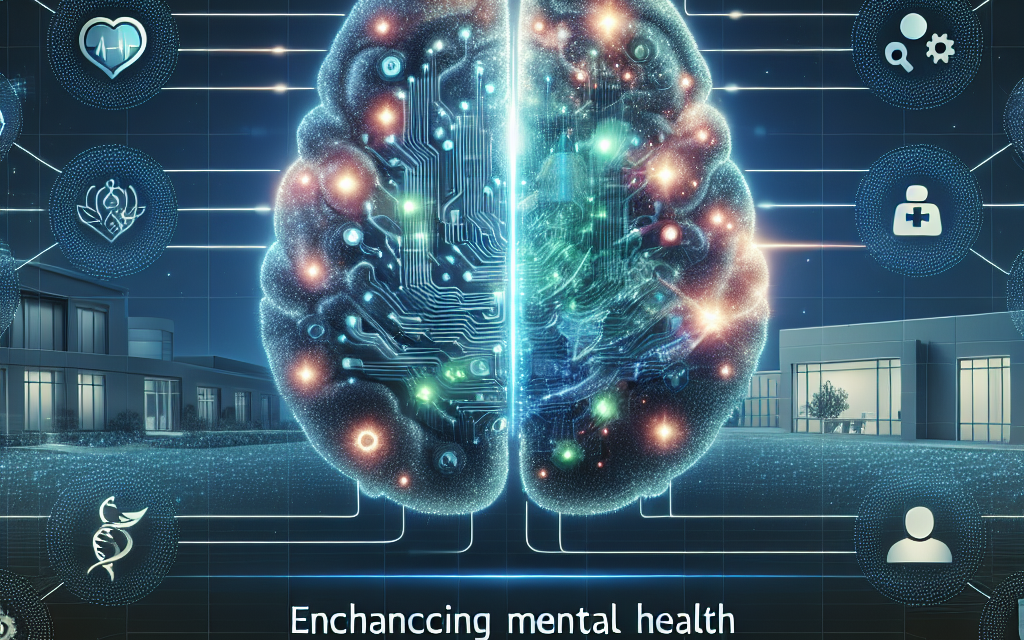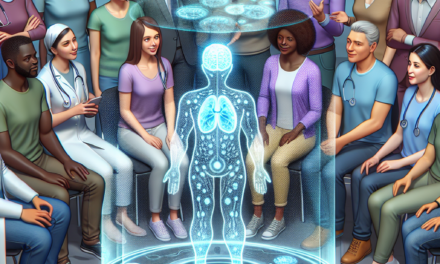Enhancing Mental Health Outcomes with Digital Therapeutics at Froedtert & MCW
In recent years, the integration of digital therapeutics into mental health care has gained significant traction, particularly in institutions like Froedtert & Medical College of Wisconsin (MCW). Digital therapeutics, which utilize software to deliver evidence-based therapeutic interventions, have emerged as a promising solution to address the growing mental health crisis. This article explores how Froedtert & MCW is leveraging digital therapeutics to enhance mental health outcomes, focusing on five key areas: the evolution of digital therapeutics, their implementation in clinical practice, the role of data analytics, patient engagement strategies, and future directions in mental health care.
The Evolution of Digital Therapeutics
The concept of digital therapeutics is not entirely new; however, its evolution has been accelerated by advancements in technology and a growing recognition of mental health issues. Digital therapeutics encompass a range of interventions, including mobile applications, online programs, and virtual reality experiences, designed to treat various mental health conditions.
Historically, mental health treatment has relied heavily on traditional methods such as psychotherapy and medication. However, the limitations of these approaches—such as accessibility, stigma, and the shortage of mental health professionals—have prompted the exploration of digital solutions. According to the National Institute of Mental Health, nearly one in five adults in the U.S. experiences mental illness, highlighting the urgent need for innovative treatment options.
Froedtert & MCW has been at the forefront of this evolution, recognizing the potential of digital therapeutics to complement traditional care. By integrating technology into their mental health services, they aim to provide more accessible, personalized, and effective treatment options for patients.
- Historical Context: The shift from traditional to digital therapies.
- Technological Advancements: The role of smartphones and the internet in mental health.
- Regulatory Landscape: FDA approvals and guidelines for digital therapeutics.
- Research and Evidence: Studies supporting the efficacy of digital interventions.
- Case Studies: Successful implementations in various healthcare settings.
Implementation in Clinical Practice
Implementing digital therapeutics in clinical practice involves several steps, including selecting appropriate tools, training staff, and integrating these tools into existing workflows. Froedtert & MCW has adopted a strategic approach to ensure that digital therapeutics are effectively incorporated into their mental health services.
One of the first steps in implementation is the selection of evidence-based digital therapeutic tools. Froedtert & MCW collaborates with technology developers to identify applications that have been validated through rigorous clinical trials. For instance, they may choose platforms that offer cognitive behavioral therapy (CBT) or mindfulness-based interventions, which have shown effectiveness in treating conditions like anxiety and depression.
Training staff is another critical component of successful implementation. Healthcare providers at Froedtert & MCW receive training on how to use digital tools effectively and how to guide patients in utilizing these resources. This training ensures that providers can offer comprehensive support, helping patients navigate the digital landscape while maintaining a therapeutic relationship.
Integration into existing workflows is also essential. Froedtert & MCW has developed protocols that allow for seamless communication between digital tools and traditional care methods. For example, providers can monitor patient progress through digital platforms and adjust treatment plans accordingly. This integrated approach not only enhances patient care but also fosters a collaborative environment among healthcare teams.
- Selection of Tools: Criteria for choosing effective digital therapeutics.
- Staff Training: Importance of equipping providers with digital skills.
- Workflow Integration: Strategies for combining digital and traditional care.
- Patient Monitoring: Using digital tools to track progress.
- Feedback Mechanisms: Gathering insights from both patients and providers.
The Role of Data Analytics
Data analytics plays a pivotal role in enhancing mental health outcomes through digital therapeutics. At Froedtert & MCW, data is leveraged to inform treatment decisions, monitor patient progress, and evaluate the effectiveness of interventions.
One of the primary benefits of digital therapeutics is the ability to collect real-time data on patient behavior and symptoms. For instance, mobile applications can track mood fluctuations, medication adherence, and engagement with therapeutic exercises. This data provides valuable insights that can guide clinical decision-making. Providers can identify patterns and trends, allowing for more personalized treatment plans tailored to individual patient needs.
Moreover, data analytics can enhance the evaluation of therapeutic effectiveness. By analyzing aggregated data from multiple patients, Froedtert & MCW can assess which digital interventions yield the best outcomes for specific populations. This evidence-based approach enables continuous improvement in treatment strategies and helps identify areas for further research.
Additionally, predictive analytics can be employed to identify patients at risk of deterioration. By analyzing historical data, Froedtert & MCW can develop algorithms that flag patients who may benefit from additional support or intervention. This proactive approach not only improves patient outcomes but also optimizes resource allocation within the healthcare system.
- Real-Time Data Collection: Benefits of tracking patient behavior.
- Personalized Treatment Plans: Using data to tailor interventions.
- Evaluating Effectiveness: Analyzing outcomes to improve strategies.
- Predictive Analytics: Identifying at-risk patients.
- Resource Optimization: Efficient allocation of healthcare resources.
Patient Engagement Strategies
Engaging patients in their mental health care is crucial for achieving positive outcomes. Froedtert & MCW employs various strategies to enhance patient engagement with digital therapeutics, recognizing that active participation is key to successful treatment.
One effective strategy is the use of gamification within digital therapeutic applications. By incorporating game-like elements, such as rewards and challenges, Froedtert & MCW can motivate patients to engage more consistently with their treatment. For example, a mobile app might offer points for completing daily exercises or achieving specific goals, fostering a sense of accomplishment and encouraging continued use.
Another approach is to provide personalized feedback through digital platforms. Patients at Froedtert & MCW receive tailored insights based on their progress, which can enhance motivation and accountability. For instance, if a patient logs their mood daily, the app can generate reports that highlight improvements or areas needing attention, prompting discussions during therapy sessions.
Additionally, Froedtert & MCW emphasizes the importance of community support in patient engagement. Digital platforms often include forums or group features where patients can connect with others facing similar challenges. This sense of community can reduce feelings of isolation and provide encouragement, further motivating patients to engage with their treatment.
- Gamification: Motivating patients through game-like elements.
- Personalized Feedback: Enhancing accountability with tailored insights.
- Community Support: Building connections among patients.
- Educational Resources: Providing information to empower patients.
- Regular Check-Ins: Maintaining engagement through consistent communication.
Future Directions in Mental Health Care
The future of mental health care at Froedtert & MCW is poised for transformation as digital therapeutics continue to evolve. Several trends and innovations are shaping the landscape of mental health treatment, promising to enhance outcomes for patients.
One significant trend is the increasing integration of artificial intelligence (AI) into digital therapeutics. AI can analyze vast amounts of data to identify patterns and predict outcomes, enabling more personalized and effective treatment plans. For instance, AI algorithms could analyze patient responses to various interventions and recommend tailored approaches based on individual preferences and needs.
Telehealth is another area expected to grow significantly. The COVID-19 pandemic accelerated the adoption of telehealth services, and this trend is likely to continue. Froedtert & MCW is exploring ways to combine telehealth with digital therapeutics, allowing patients to access therapy and support remotely while utilizing digital tools to enhance their treatment experience.
Moreover, the focus on mental health equity is gaining momentum. Froedtert & MCW is committed to ensuring that digital therapeutics are accessible to diverse populations, addressing disparities in mental health care. This includes developing culturally relevant interventions and providing resources in multiple languages to reach underserved communities.
- Artificial Intelligence: Enhancing personalization through data analysis.
- Telehealth Integration: Combining remote care with digital tools.
- Mental Health Equity: Addressing disparities in access to care.
- Innovative Interventions: Exploring new therapeutic modalities.
- Collaborative Care Models: Fostering teamwork among healthcare providers.
Conclusion
The integration of digital therapeutics at Froedtert & MCW represents a significant advancement in the field of mental health care. By embracing technology, the institution is enhancing treatment accessibility, personalizing interventions, and improving patient engagement. The evolution of digital therapeutics, their implementation in clinical practice, the role of data analytics, patient engagement strategies, and future directions all contribute to a comprehensive approach to mental health care.
As the mental health landscape continues to evolve, Froedtert & MCW remains committed to leveraging digital therapeutics to improve outcomes for patients. By prioritizing innovation and collaboration, they are paving the way for a more effective and equitable mental health care system. The future holds promise for enhanced mental health outcomes, driven by the integration of technology and evidence-based practices.





